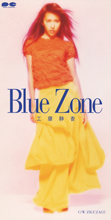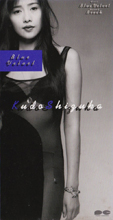
"Blue Velvet" is a song recorded by Japanese singer Shizuka Kudo for her thirteenth studio album, I'm Not. It was released by Pony Canyon as the album's leading single on May 28, 1997. It served as the third ending theme song to the Fuji Television anime series Dragon Ball GT, from episode 42 to episode 50. Out of all the artists that have contributed to the series' soundtracks, Kudo is the only one who is unaffiliated with a Being Inc. label. Kudo, who is a self-proclaimed Dragon Ball fan, received an autographed hand-drawn illustration of Goku from series creator Akira Toriyama for her 28th birthday.
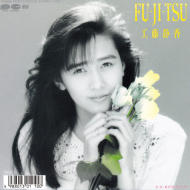
"Fu-ji-tsu" is a song recorded by Japanese singer Shizuka Kudo for her eponymous second studio album, Shizuka. It was released on June 1, 1988 through Pony Canyon as the album's leading single. The song was written by Miyuki Nakajima and composed and produced by Tsugutoshi Gotō. This collaboration with a respected singer-songwriter like Nakajima, as well as Kudo's overall shift in image, were seen as a catalyst for the end of the 1980s idol phenomenon, with Kudo's career path being regarded as the blueprint for the successful transition from idol to artist.
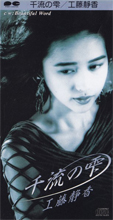
"Senryū no Shizuku" is a song recorded by Japanese singer Shizuka Kudo. It was released as a single through Pony Canyon on May 9, 1990. It marks the debut of Kudo as a songwriter. The song was featured on commercials for Taiyo Yuden That's cassette tapes. Similarly to her previous single, "Kuchibiru Kara Biyaku", a limited number of 7-inch vinyls of the single were produced for promotional use. "Senryū no Shizuku" has never appeared on an original album, but was included in the compilation album Unlimited (1990).

"Blue Rose" is a song recorded by Japanese singer Shizuka Kudo, from her ninth studio album, Expose. It was released through Pony Canyon as the album's lead single on March 18, 1994. The song marks a significant change in artistic direction for Kudo, as it is her first single to be self-produced, as well as her first release since parting ways with long-time collaborator Tsugutoshi Gotō, who has helmed Kudo's songwriting team since her solo debut. It was featured on TV commercials for Seagaia Ocean Dome. The single's B-side, "Door", is the ending theme to the TX television series Tsumiki Kuzushi: Hōkai, Soshite.... Kudo performed "Blue Rose" on the 45th Kōhaku Uta Gassen, marking her seventh consecutive appearance on the show. It is the first in a trilogy of singles with the word "blue" in the title: "Blue Rose" was later followed by "Blue Velvet" and "Blue Zone".

"Jaguar Line" is a song recorded by Japanese singer Shizuka Kudo, from her ninth studio album, Expose. It was released through Pony Canyon as the album's second and final single on July 21, 1994.

"Ice Rain" is a song recorded by Japanese singer Shizuka Kudo for her tenth studio album, Purple. It was released through Pony Canyon as the album's lead single on November 18, 1994, merely two months following the release of her ninth studio album, Expose. The single was released simultaneously with Kudo's third video album, Female III. An English version of the song was recorded for the compilation album, Best of Ballade: Current (1998). In 2015, DAM asked their users to select their favorite Shizuka Kudo songs to sing karaoke to and compiled a top ten list; "Ice Rain" came in at number three and was the only song penned by Kudo to make the top ten.

"Moon Water" is a song recorded by Japanese singer Shizuka Kudo, from her tenth studio album, Purple. It was released through Pony Canyon as the album's second single on May 19, 1995. When Kudo appeared on the AX tanpatsu drama Ren'ai Zenya: Ichido Dake 2 (1996) as a drawing-class model, the artwork she was the subject of is revealed to be a direct replication of the "Moon Water" cover art.

"7" is a song recorded by Japanese singer Shizuka Kudo for her eleventh studio album, Doing. It was released by Pony Canyon as the album's lead single on November 20, 1995. The song was the ending theme to the AX variety show TV Oja Mammoth, while the single's B-side, "Hachigatsu..." was featured on the AX tanpatsu drama Ren'ai Zenya: Ichido Dake (1996), on which Kudo appeared in a supporting role. "7" is the first in a consecutive trilogy of singles with one-character titles: "7" is followed by "Chō" and "Yū".
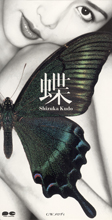
"Chō" is a song recorded by Japanese singer Shizuka Kudo for her eleventh studio album, Doing. It was released through Pony Canyon as the album's second and last single on March 21, 1996. The song featured on TV commercials for the Takano Yuri Beauty Clinic. The B-side, "Melody", served as ending theme to the 1996 AX tanpatsu drama Ren'ai Zenya: Ichido Dake. "Chō" is the second in a consecutive trilogy of singles with titles made up of only one character: "Chō" is preceded by "7" and followed by "Yū". It is Kudo's last single to be released in cassette format.
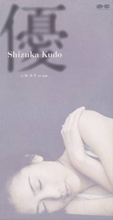
"Yū" is a song recorded by Japanese singer Shizuka Kudo, released as a single through Pony Canyon on June 5, 1996. It featured as the theme song on the ninth and penultimate installment of the Gokudō no Onna-tachi Yakuza film series, Gokudō no Onna-tachi: Kiken na Kake (1996), starring Kudo herself.

"Gekijō" is a song recorded by Japanese singer Shizuka Kudo, from her twelfth studio album, Dress. It was released by Pony Canyon as the album's lead single on November 7, 1996. It is the theme song of the CX television series Yuzurenai Yoru, starring Kudo herself. "Gekijō" was written by Miyuki Nakajima specifically for the drama; after reading the script, Kudo immediately thought of Nakajima for the soundtrack and sought to have her write the theme song. Nakajima's lyrics invoke the series' title, which loosely translates to "Unyielding Night".

"Kama Sutra no Densetsu" is a song recorded by Japanese singer Shizuka Kudo for her thirteenth studio album, I'm Not. It was released by Pony Canyon as the album's second and last single on November 19, 1997.

"Isshun" is a song recorded by Japanese singer Shizuka Kudo. It was released as a single by Pony Canyon on November 6, 1998. The song served as theme song to the EX morning show Yajiuma Wide. It made its first album appearance on the compilation album, Millennium Best.
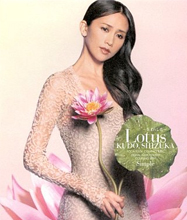
"Lotus " is a song recorded by Japanese singer Shizuka Kudo, from her sixteenth studio album, Tsukikage. It was released by Pony Canyon as the album's lead single on February 16, 2005, and is Kudo's first single in close to three years. The song was featured on TV commercials for Daihatsu Tanto, starring Kudo herself, which had previously featured Kudo singing a cover of Seiko Matsuda's "Sweet Memories".

"Kokoro no Chikara" is a song recorded by Japanese singer Shizuka Kudo, from her sixteenth studio album, Tsukikage. It was released by Pony Canyon as the album's second single on April 27, 2005. The song was featured as the theme song on the first installment of the Pretty Cure anime film series, Futari wa Pretty Cure Max Heart the Movie (2005), for which she also voiced the character of the Queen of the Garden of Hope. A separate edition of the single including an alternate version of the song, as well as another song from the movie performed by Mayumi Gojo, was released by Marvelous Entertainment on May 25, 2005.

"Amayo no Tsuki ni" is a song recorded by Japanese singer Shizuka Kudo. It was released as a single by Pony Canyon on May 23, 2007. It served as the theme song to the CX daytime television series Uruwashiki Oni. The song made its first album appearance on the memorial compilation album, Shizuka Kudo 20th Anniversary the Best, released later that same year.

Millennium Best is the ninth compilation album by Japanese singer Shizuka Kudo. It was released on March 15, 2000, through Pony Canyon. It is Kudo's second single collection: the album features all of Kudo's singles released from "Kindan no Telepathy" (1987) up to her most recent at the time, "Blue Zone" (1999), as well as all five singles released by Ushirogami Hikaretai. The album was released digitally on May 28, 2014, however only the four singles missing from the subsequently released compilation Shizuka Kudo Best were made available for download.
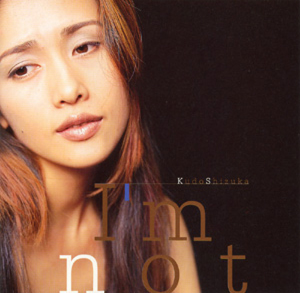
I'm Not is the thirteenth studio album by Japanese singer Shizuka Kudo. It was released on April 29, 1998, through Pony Canyon. The album was entirely produced and composed by Sharam Q guitarist, Hatake, while Kudo wrote the lyrics for all ten songs, under the pseudonym Aeri. The album features prominent rock musicians such as Hideki Samejima of Hound Dog on bass, Munetaka Higuchi of Loudness on drums, and Vow Wow's Rei Atsumi on the keyboard.
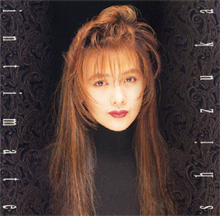
Intimate is the fourth compilation album by Japanese singer Shizuka Kudo. It was released on December 11, 1991, through Pony Canyon. The album features all singles released from "Koi Hitoyo" (1988) through "Metamorphose" (1991). The opening track, "Dare mo Shiranai Blue Angel" is a re-worked solo recording of an Ushirogami Hikaretai song by the same name released as a B-side to the single "Hora ne, Haru ga Kita" in 1988. The closing track is a new song entitled "Rashikunai", written specifically for the album by Kudo herself, under the pseudonym Aeri.

Expose is the ninth studio album by Japanese singer Shizuka Kudo. It was released on September 7, 1994, through Pony Canyon. The album was recorded and mastered in Los Angeles. Expose is Kudo's first self-produced album. It yielded the two singles, "Blue Rose" and "Jaguar Line".
